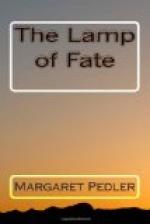“I nearly gave my life for her,” she protested with fierce simplicity. “I could do no more! Is it because le bon dieu has sent me a little daughter instead of a little son that you hate me so much?”
And Catherine had answered her in a voice of quiet, concentrated animosity:
“If you had died then—died childless—I should have thanked God day and night.”
Diane, isolated and unhappy, turned to her baby for consolation. It was all that was left to her out of the wreck of her life, and the very fact that both Hugh and Catherine seemed to regard the little daughter with abhorrence only served to strengthen the passionate worship which she herself lavished upon her.
The child—they had called her Magda—was an odd little creature, as might have been expected from the violently opposing characteristics of her parents.
She was slenderly made—built on the same lithe lines as her mother—and almost as soon as she was able to walk she manifested an amazing balance and suppleness of limb. By the time she was four years old she was trying to imitate, with uncertain little feet and dimpled, aimlessly waving arms, the movements of her mother, when to amuse the child, she would sometimes dance for her.
However big a tragedy had occurred in Magda’s small world—whether it were a crack across the insipid china face of a favourite doll or the death of an adored Persian kitten—there was still balm in Gilead if "petite maman" would but dance for her. The tears shining in big drops on her cheeks, her small chest still heaving with the sobs that were a passionate protest against unkind fate, Magda would sit on the floor entranced, watching with adoring eyes every swift, graceful motion of the dancer, and murmuring in the quaint shibboleth of French and English she had imbibed from old Virginie.
On one of these occasions Hugh came upon the two unexpectedly and brought the performance to a summary conclusion.
“That will do, Diane,” he said icily. “I should have thought you would have had more self-respect than to dance—in that fashion—in front of a child.”
“It is, then, a sin to dance—as it is to be married?” demanded Diane bitterly, abruptly checked in an exquisite spring-flower dance of her own invention.
“I forbid it; that is sufficient,” replied Hugh sternly.
His assumption of arrogant superiority was unbearable. Diane’s self-control wavered under it and broke. She turned and upbraided him despairingly, alternately pleading and reproaching, battering all her slender forces uselessly against his inflexible determination.
“This is a waste of time, Diane—mine, anyway,” he told her. And left her shaken with grief and anger.
Driven by a sense of utter revolt, she stormed her way to Catherine, who was composedly sorting sheets in the linen room.
“I will not bear it!” she burst out at her furiously. “What have I done that I should be treated as an outcast—a pariah?”




